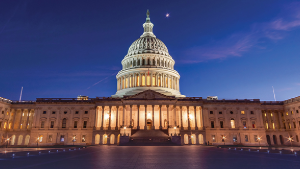
ADA Advocacy: Reconciliation Update
Reprinted from ADA Advocacy email update, July 1
On July 1, the Senate passed its substitute for H.R. 1, the One Big, Beautiful Bill Act (OBBB), by a vote of 51-50, with the Vice President breaking the tie. In addition to extensive lobbying activity on Capitol Hill, the ADA submitted written comments to Senate Leadership highlighting our top priorities calling for fair economic treatment for all dental practices, supporting a stable dental workforce and preserving access to dental care.
Because of ADA’s tireless lobbying and strong grassroots advocacy since passage of the House’s version of the OBBB in May, we successfully secured the restoration of the Pass-Through Entity Tax (PTET) deduction in the Senate bill – avoiding a nearly 5 percent tax increase on S-Corporations and partnerships and preserving tax parity with other pass-through entities (pending final passage). The ADA’s leadership on this issue was crucial to its preservation. PTET was under siege, but we led a broad coalition of 31 health care groups, organized cross-industry action for affected pass-throughs, and utilized detailed data from the ADA’s Health Policy Institute to make our case to Congress. In addition, state executive directors from dental associations across the country contacted their Senators about PTET (and other pressing reconciliation issues) and a grassroots alert directed our members to send more than 11,000 letters to their members of Congress in support of the PTET deduction.
The Senate bill also includes several tax provisions favorable to dental practices:
- Permanent 20 percent Small Business Income Deduction, providing long-term tax relief for eligible dental practices;
- Restoration of full bonus depreciation, enabling practices to invest in technology and equipment that enhance patient care;
- New domestic research deductions, encouraging innovation and discovery in oral health care;
- Maintaining the 21 percent corporate tax rate, supporting economic competitiveness.
We are also advocating to ensure that dental education remains accessible and affordable, especially given the Senate’s provisions on student loans (set to take effect July 1, 2026):
- Elimination of the GradPLUS loan program would create financial strain for the 76 percent of dental students who depend on these loans to pursue higher education.
- Reduction to two loan repayment options would limit borrower flexibility and may lead to higher monthly payments.
- Proposed aid caps could make dental schools unaffordable for qualified students or push them toward riskier private loans.
In a positive development, the Senate Parliamentarian struck a provision that would have limited the Public Service Loan Forgiveness (PSLF) program. This is a win for dental students whose time in residency will continue to count toward the program’s requirements.
The ADA remains actively engaged on several Medicaid reform provisions in the OBBB that could negatively impact access to adult dental benefits including, but not limited to:
- Stricter eligibility verification and redeterminations which may cause disenrollment;
- New cost-sharing requirements which could deter preventive care;
- Caps on dental reimbursement which can risk provider participation.

